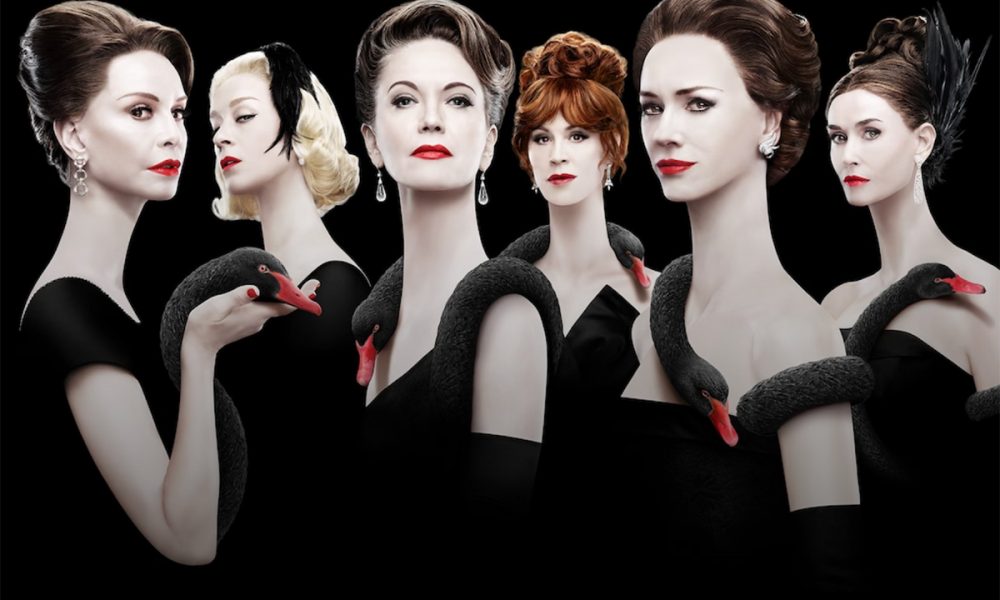
Nothing is more of a pick-me-up in the doldrums of winter than a fabulously acted, incredibly stylish feud. Complete with Champagne flutes and a splendiferous mid-century ball at New York City’s Plaza Hotel. Especially, when it’s part of the ouevre of queer TV producer and creator Ryan Murphy, whose beloved shows include “American Horror Story,” “Glee” and the anthology series “Feud.”
Season 2 of Feud, “Feud: Capote vs. The Swans,” which premiered on Jan. 31, will air weekly on FX through March 13. Episodes stream the next day on Hulu.
“Feud’s” powerhouse cast, which delivers stellar performances, includes: Tom Hollander as Truman Capote along with Naomi Watts, Diane Lane, Chloe Sevigny and Calista Flockhart as Capote’s swans.
Demi Moore plays Ann Woodward, a socialite who Capote falsely said intended to murder her husband. Molly Ringwald portrays Joanne Carson who befriended Capote when nearly no one would take him in. The role of CBS chairman Bill Paley fits the late Treat Williams like a glove.
Hollander makes Capote seem like a brilliant, flawed, cruel, sometimes kind, human being, rather than a “fairy” caricature.
Jessica Lang does a star turn as the ghost of Capote’s mother. Gus Van Sant directs most of the episodes of “Feud.”
“Feud” is based on Laurence Leamer’s book “Capote’s Women.” Playwright and screenwriter Jon Robin Baitz adapted Leamer’s book into the miniseries “Feud.”
“Feud” is the story of how acclaimed queer author Capote, after becoming their best friend betrayed his “swans.”
“The swans,” were the rich, beautiful, New York society women who confided their secrets (from their insecurities about their looks to their husbands’ infidelities) to Capote.
These “swans,” who took Capote into their inner circle, were: Babe Paley (wife of CBS chairman Bill Paley), Lee Radziwill (Jackie Kennedy’s sister), socialite Slim Keith (ex-wife of Howard Hawks and Leland Hayward) and socialite C.Z. Guest.
“You can’t blame a writer for what the characters say,” Capote, once said.
His swans didn’t agree with Capote’s dictum.
Capote’s betrayal of the swans occurred in 1975. That year, “Esquire” published “La Cote Basque, 1965,” a chapter from Capote’s much anticipated novel “Answered Prayers.”
(Capote never completed the novel. An unfinished version was published after his death.)
The “Esquire” story, set in the restaurant where Capote often lunched with his “swans,” hurt and infuriated “the ladies who lunched.” The details revealed in the “Esquire” story were so personal and thinly veiled that the “swans” felt readers would easily identify them.
“Feud” depicts the bonds of friendship that frequently exist between hetero women and queer men. Capote gave his “swans” the love and attention their spouses failed to provide. Babe Paley called Capote her “second husband.”
For Capote, an outsider because he was gay, “the swans” provided acceptance, association with high society (which he both loved and despised) and material for his writing.
Capote became estranged from the “swans” right after the “Esquire” story was published.
“Feud” goes back and forth in time. At first, this is a bit disconcerting. But, soon, it keeps things moving, and provides fascinating glimpses into Capote and the “swans.”
Bill and Babe Paley think Capote is the “other Truman” (Harry Truman) when they meet him in the 1950s.
In the 1970s, after the “swans” have shunned him, Capote is a washed-up, alcoholic, drug-addicted has-been. (Capote died in 1984 at age 59 of liver disease.)
The third episode is the stand-out of “Feud.” In 1966, Capote was at the height of his power after “In Cold Blood, his “non-fiction” novel, had been published to much acclaim and commercial success. To celebrate, Capote threw a Black and White masquerade ball. The ball, to which Capote invited 540 guests, was the most famous party of the 20th century. Katherine Graham of The Washington Post was the guest of honor.
The episode is shot as a (fictional) documentary of the ball. Shot in black and white, it’s visually stunning. We see interviews with some of the “swans,” who are ticked off, but trying not to show it, because Capote had led them to believe they would be the guest of honor.
Watch “Feud,” if you like glam, hats, white gloves, cocktails and wit doused with betrayal and regret.
